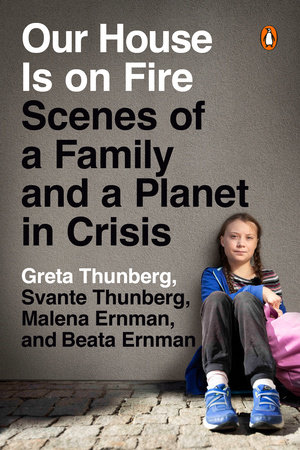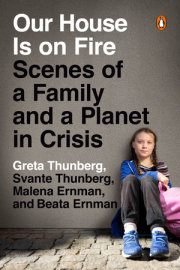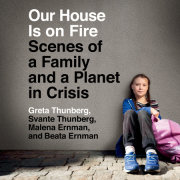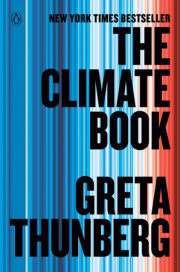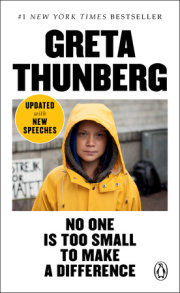Preface
This could have been my story. An autobiography of sorts, had I been so inclined.
But autobiographies don’t really interest me. There are other more important things.
This story was written by Svante and me together with our daughters, and it’s about the crisis that struck our family.
It’s about Greta and Beata.
But above all it’s about the crisis that surrounds and affects us all. The one we humans have created through our way of life: beyond sustainability, divorced from nature, to which we all belong. Some call it over-consumption, others call it a climate crisis.
The vast majority seem to think that this crisis is happening somewhere far away from here, and that it won’t affect us for a very long time yet.
But that’s not true.
Because it’s already here and it’s happening around us all the time, in so many different ways. At the breakfast table, in school corridors, along streets, in houses and apartments. In the trees outside your window, in the wind that ruffles your hair.
Perhaps some of the things that Svante and I, along with the children, decided to share here, after considerable delibera- tion, should have been saved for later.
Once we had more distance. Not for our sake, but for yours.
No doubt this would have been perceived as more accept- able. A bit more agreeable.
But we don’t have that kind of time. To have a fighting chance, we have to put this crisis in the spotlight right now.
A few days before this book was first published in Sweden in August 2018, our daughter Greta Thunberg sat down outside the Swedish Parliament and began a school strike for the climate – a strike that is still going on today, on Mynttorget in the Old Town in Stockholm, and in many places around the world.
Since then a lot has changed. Both for her and for us as a family.
Some days it’s almost like a fairy tale. A saga. But that’s a story for another book.
This story is about the road to Greta’s school strike. The road to 20 August 2018.
Malena Ernman, November 2018
P.S. Before this book was published we announced that any money we might earn from it would go to Greenpeace, the World Wildlife Fund, and other non-profit organizations, through a foundation we’ve set up.
And that’s how it is.
Because that’s what Greta and Beata have decided.
I
Behind the Curtain Elegy For the day wears on. The sun will die at seven.
Speak up, experts on darkness, who will brighten us now?
Who turns on a Western backlight, who dreams an Eastern dream? Someone, anyone, bring a lantern!
Preferably you.
– Werner Aspenström
Scene 1.
One Last Night at the Opera It’s places, everyone.
The orchestra tune their instruments one last time and the lights go down in the hall. I’m standing next to the conductor, Jean-Christophe Spinosi, we’re just about to walk through the stage door and take our positions.
Everyone is happy tonight. It’s the final performance, and tomorrow we all get to go home to our loved ones. Or on to the next job. Home to France, Italy and Spain. Home to Oslo and Copenhagen. On to Berlin, London and New York.
The last few performances have felt like being in a trance. Anyone who has ever worked on stage knows what I mean.
Sometimes there is a kind of flow, an energy that builds in the interaction between stage and audience and sets off a chain reaction that unfolds from performance to performance, from night to night. It’s like magic. Theatre and opera magic.
And now we’re at the final performance of Handel’s
Xerxes at the Artipelag arts centre in the Stockholm archipelago. It is 2 November 2014, and on this evening I will sing my last opera in Sweden. But no one is aware of that. Including me.
This evening I will sing my last opera ever.
The atmosphere is electric, and everyone backstage is walk- ing on air, a few centimetres above Artipelag’s brand new concrete floor.
They are filming as well. Eight cameras and a full-scale production team are recording the performance.
Through the stage door you can hear the sound of 900 silent people. The King and Queen are in attendance. Everyone is there. I’m pacing back and forth. I’m trying to breathe, but I can’t.
My body seems to want to twist to the left and I’m sweating. My hands are falling asleep. The last seven weeks have been one long nightmare. Nowhere is there the slightest bit of calm. I feel sick, yet beyond nausea. Like a drawn-out panic attack.
As if I had slammed right into a glass wall and got stuck mid-air as I was falling to the ground. I’m waiting for the thud. Waiting for the pain. I’m waiting for blood, broken bones and the wail of ambulances.
But nothing happens. All I see is myself suspended in the air in front of that bloody glass wall, which just stands there with- out the slightest crack.
‘I’m not feeling well,’ I say.
‘Sit down. Do you want some water?’ We’re speaking French, the conductor and I.
Suddenly my legs give out. Jean-Christophe catches me in his arms.
‘It’s fine,’ he says. ‘We’ll delay the performance. They can wait. We’ll blame it on me, I’m French. We’re always late.’
Someone laughs.
I really have to hurry home after the performance. My younger daughter, Beata, is turning nine tomorrow and I have a thousand things to take care of. But now I am where I am. Unconscious, in the arms of the conductor.
Typical.
Someone caresses my forehead. Cut to black.
Scene 2.
The Ironworks I grew up in a terrace house in the small, northern town of Sandviken, Sweden. Mum was a deacon and Dad worked as an accountant at the Sandvik ironworks. I have a sister, Vendela, three years my junior, and a brother, Karl-Johan. Mum named him after the Swedish baritone Carl-Johan ‘Loa’ Falkman because she thought Loa was so handsome.
This was the extent of the connection to opera and classical music I had at home.
We did like to sing though. We sang a lot. Folk music, ABBA, John Denver. All in all we were just another small- town Swedish family. The only thing that might have set us apart was my parents’ involvement with vulnerable people.
In our little home on Ekostigen, on the outskirts of the Vallhov neighbourhood, humanitarianism reigned – if some- one needed help it was our duty to try to offer that help to them. My mother carried on this family tradition from her father, Ebbe Arvidsson, who was a high-up official in the Church of Sweden and a pioneer in ecumenism and modern aid work. So in my younger years I often found myself living under the same roof as refugees and undocumented immigrants.
It could be a bit chaotic at times. But it worked out fine.
Whenever we travelled somewhere it was always to visit my mother’s best friend, who was a nun; we spent several summers at her convent in the north of England. This is prob- ably why I swear so much on stage. The habit must stem from
a sort of chronic childhood tendency towards rebellion, which I don’t think I’ll ever quite shake.
But apart from the fact that we spent our summers in the dormitories of English convents and that we had refugees liv- ing in the garage, we were just like everyone else.
As I said, we sang, and I loved to sing. I sang all the time.
I sang everything and anything – the harder the piece, the more fun it was.
Much later, when I chose to become an opera singer, it was probably for the simple fact that I love a challenge. After all, nothing was harder or more fun than singing opera.
Copyright © 2020 by Greta Thunberg, Svante Thunberg, Malena Ernman, and Beata Ernman. All rights reserved. No part of this excerpt may be reproduced or reprinted without permission in writing from the publisher.

